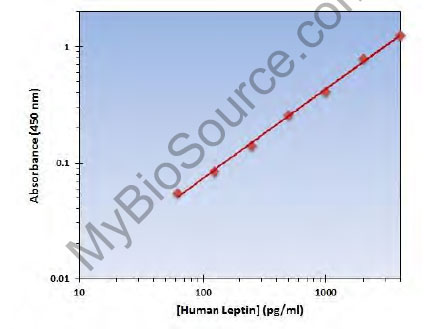Mouse JE/MCP-1 ELISA Kit | JE/MCP-1 elisa kit
JE/MCP-1 (Murine) OmniKine ELISA Kit
Gene Names
Ccl2; JE; HC11; MCAF; MCP1; MCP-1; Scya2; Sigje; SMC-CF; AI323594
Reactivity
Mouse
Synonyms
JE/MCP-1; N/A; JE/MCP-1 (Murine) OmniKine ELISA Kit; C-C motif chemokine 2; Monocyte chemoattractant protein 1; Monocyte chemotactic protein 1; Platelet-derived growth factor-inducible protein JE; Small-inducible cytokine A2; Scya2; JE/MCP-1 elisa kit
Reactivity
Mouse
Specificity
The OmniKine Murine JE/MCP-1 ELISA is capable of recognizing both recombinant and naturally produced Murine JE/MCP-1 proteins. The antigens listed below were tested at 50 ng/ml and exhibited 100% cross reactivity.
Rat: MCP-1
The antigens listed below were tested at 50 ng/ml and exhibited less than 2% cross reactivity.
Murine: MCP-3
The antigens listed below were tested at 50 ng/ml and exhibited less than 1% cross reactivity.
Human: MCP-1, MCP-3
Murine: MCP-5
The antigens listed below were tested at 50 ng/ml and did not exhibit significant cross reactivity or interference.
Human: CTACK, MCP-2, MIP-4, MIP-1beta
Murine: C10, CTACK, Eotaxin, KC, MCP-2, MDC, MIP-1alpha, MIP-1beta, MIP-1gamma, MIP-3beta, RANTES
Rat: MCP-1
The antigens listed below were tested at 50 ng/ml and exhibited less than 2% cross reactivity.
Murine: MCP-3
The antigens listed below were tested at 50 ng/ml and exhibited less than 1% cross reactivity.
Human: MCP-1, MCP-3
Murine: MCP-5
The antigens listed below were tested at 50 ng/ml and did not exhibit significant cross reactivity or interference.
Human: CTACK, MCP-2, MIP-4, MIP-1beta
Murine: C10, CTACK, Eotaxin, KC, MCP-2, MDC, MIP-1alpha, MIP-1beta, MIP-1gamma, MIP-3beta, RANTES
Form/Format
12 x 8-Well Microstrips
Sequence Length
148
Samples
Detection And Quantification Of Human Pcsk9 Concentrations In Cell Lysates, Sera And Plasma
Assay Type
Quantitative Sandwich
Sensitivity
125-8000 pg/ml.
Preparation and Storage
Store entire kit at 4 degree C until use. Kit expiration is 3 months from date of shipment.
Related Product Information for JE/MCP-1 elisa kit
Principle of the Assay: The OmniKine Human PCSK9 ELISA Kit contains the components necessary for quantitative determination of natural or recombinant Human PCSK9 concentrations within any experimental sample including cell lysates, serum and plasma. This particular immunoassay utilizes the quantitative technique of a "Sandwich" Enzyme-Linked Immunosorbent Assay (ELISA) where the target protein (antigen) is bound in a "sandwich" format by the primary capture antibodies coated to each well-bottom and the secondary detection antibodies added subsequently by the investigator. The capture antibodies coated to the bottom of each well are specific for a particular epitope on Human PCSK9 while the user-added detection antibodies bind to epitopes on the captured target protein. Amid each step of the procedure, a series of wash steps must be performed to ensure the elimination of non-specific binding between proteins to other proteins or to the solid phase. After incubation and "sandwiching" of the target antigen, a peroxidase enzyme is conjugated to the constant heavy chain of the secondary antibody (either covalently or via Avidin/Streptavidin-Biotin interactions), allowing for a colorimetric reaction to ensue upon substrate addition. When the substrate TMB (3, 3', 5, 5'-Tetramethylbenzidine) is added, the reaction catalyzed by peroxidase yields a blue color that is representative of the antigen concentration. Upon sufficient color development, the reaction can be terminated through addition of Stop Solution (2 N Sulfuric Acid) where the color of the solution will turn yellow. The absorbance of each well can then be read by a spectrophotometer, allowing for generation of a standard curve and subsequent determination of protein concentration!!Background/Introduction: Proprotein Convertase 9/PCSK9 may be implicated in the differentiation of cortical neurons and may play a role in cholesterol homeostasis. The enzyme is inhibited by EGTA. PCSK9 is expressed in neuro-epithelioma, colon carcinoma, hepatic and pancreatic cell lines, and in Schwann cells. The soluble zymogen undergoes autocatalytic intramolecular processing in the endoplasmic reticulum, resulting in the cleavage of its propeptide that remains associated with the secreted enzyme. Variant Leu-23 insertion polymorphism in PCSK9 might have a modifier effect on LDLR mutation and familial hypercholesterolemia. Defects in PCSK9 are the cause of hypercholesterolemia autosomal dominant type 3 (HCHOLA3), a familial condition characterized by elevated circulating cholesterol contained in either low-density lipoproteins alone or also in very-low-density lipoproteins.
NCBI and Uniprot Product Information
NCBI GI #
NCBI GeneID
NCBI Accession #
NCBI GenBank Nucleotide #
Molecular Weight
16,326 Da
NCBI Official Full Name
C-C motif chemokine 2
NCBI Official Synonym Full Names
chemokine (C-C motif) ligand 2
NCBI Official Symbol
Ccl2
NCBI Official Synonym Symbols
JE; HC11; MCAF; MCP1; MCP-1; Scya2; Sigje; SMC-CF; AI323594
NCBI Protein Information
C-C motif chemokine 2
UniProt Protein Name
C-C motif chemokine 2
UniProt Gene Name
Ccl2
UniProt Synonym Gene Names
Je; Mcp1; Scya2; MCP-1




















